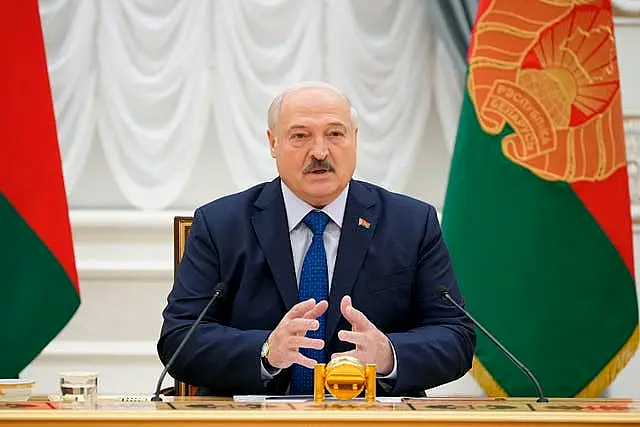Nobel Peace Prize laureate and activist Ales Bialiatski has been transferred to solitary confinement at his prison in Belarus, his wife said.
Natalia Pinchuk told the Associated Press that prison authorities have toughened conditions for the 61-year-old who is serving a 10-year sentence, despite his chronic illnesses.
“Effectively, it’s a prison inside prison,” she said. Prison authorities did not allow him to meet his lawyer after his transfer over alleged disciplinary violations, she added.
Mr Bialiatski, Belarus’s top human rights advocate and one of the winners of the 2022 Nobel Peace Prize, was convicted in March with three colleagues on charges of financing actions violating public order and smuggling, accusations he denied.
He has been serving his sentence at a prison colony for repeat offenders in the city of Gorki. The facility is known for inmates being beaten and subjected to hard labour.
“The prison colony in Gorki has an awful reputation as a conveyor belt for tormenting political prisoners,” said Ms Pinchuk, who spoke by phone from Strasbourg, where she attended a conference of the Council of Europe.
“The authorities in Belarus are continuing brutal repressions, showing that they may subject anyone to torturous conditions regardless of the Nobel prize.”
Ales Bialiatski – awarded the 2022 #NobelPeacePrize – was one of the initiators of the democracy movement that emerged in Belarus in the mid-1980s. He has devoted his life to promoting democracy and peaceful development in his home country.#NobelPrize pic.twitter.com/p1KHHFkSse
— The Nobel Prize (@NobelPrize) October 7, 2022
The arrests of Bialiatski and his colleagues came in response to massive protests over a 2020 election that extended authoritarian President Alexander Lukashenko’s rule and were seen by the opposition and many in the West as a sham.
The protests were the largest Belarus has seen. More than 35,000 people were arrested and thousands were beaten by police.
Mr Lukashenko, a longtime ally of Russian President Vladimir Putin who backed Russia’s invasion of Ukraine, has ruled Belarus since 1994.
Mr Bialiatski shared the 2022 Nobel with Russian human rights group Memorial and the Ukrainian Centre for Civil Liberties.

He founded the Human Rights Centre Viasna, Belarus’s most prominent human rights group. It has been branded an “extremist organisation” by Belarusian authorities.
Viasna representative Pavel Sapelka told the AP that Mr Bialiatski’s move to solitary confinement could involve restrictions on walks, prison meals and food deliveries.
“It means a significant tightening of prison conditions,” he said.
Mr Sapelka said Belarus currently has 1,462 political prisoners.
“The Belarusian authorities are blocking access to lawyers, maintaining an information blackout and openly ignoring international norms with regard to all political prisoners,” he said.







